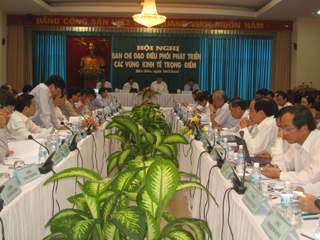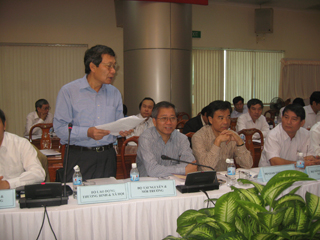HTML clipboard
 |
|
Meeting |
At the meeting, the representatives of ministries and sectors reported to the
Deputy Prime Minister on the socio-economic situation and the operations of the
Development Coordination Committee of the four key economic regions. In 2009, in
spite of the difficulties facing the global and Vietnamese economy, the growth
rate of the key economic regions reached 11.1%, twice as much as that of the
country (over 5%); GDP per capita rises year by year and sustains a high growth
rate; total budget revenue in 2009 hits 88.9%; the export turnover of the key
economic regions makes up a large proportion compared to that of the country.
The assessment by the Key Economic Region Development Coordination Committee
reveals that the regions’ coordination activities have gradually improved and
taken shape, that the Ministry of Traffic and Transport has made planning for
inter-regional transportation systems, that the awareness of environmental
protection in key economic regions has been raised and that local authorities
have closely cooperated with one another to tackle environmental pollution and
to have polluted rivers treated.
 |
|
A
delegate is delivering a speech at the meeting |
The meeting focused on issues: solid and hazardous waste treatment, climate
change impacts, polluted rivers, inter-regional traffic, vocational training and
water supply for key economic regions. The representatives of the provinces
within the key economic regions claimed that there exists ineffective
coordination and no links between regions, resulting in the fact that regions
take actions one way or another. For this reason, delegates proposed that a
financial preferred mechanism for regions be made and regional links be
fostered.
Addressing the meeting, Deputy Prime Minister Hoang Trung Hai concluded: “The
four key economic regions are developing faster and faster and they are
undergoing a successful transition in the structure of the economy. This creates
a driving force in regional development. So, to reach the 2020 targets – that is
to make Vietnam a modern industrial country, key economic regions have to grow
more rapidly and “start first and finish first”. “Ministries and sectors have to
work closely with the local authorities of key economic regions to promote the
growth and the transition in the structure of the economy quickly and
successfully. We have to better develop services sector and give a top priority
to making planning. To carry out the planned projects, capital accumulation is a
prerequisite. We have to give a priority to ODA and FDI disbursement. We have to
re-consider our investment attraction activities, give a priority to attracting
investment into large projects in areas of great potential and achieve a
breakthrough in development” continued Hai. Concerning delegates’ proposals, he
requested that ministries, sectors and local authorities promote regional links,
complete the infrastructure in a quick manner, establish hazardous waste
treatment zones in key economic regions and develop economic corridors.
Reported by Lien Huong,
Translated by Duy Minh